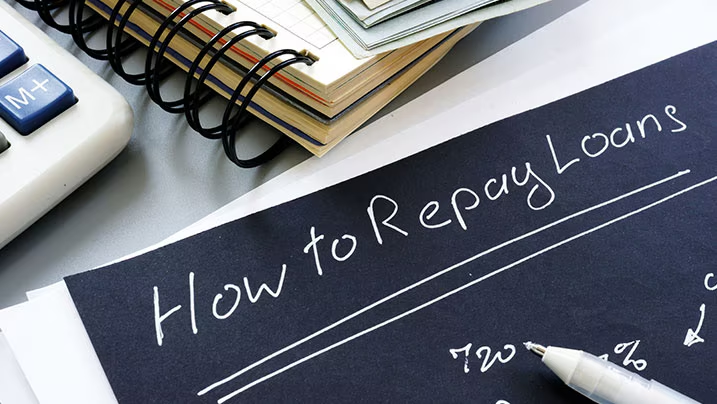Introduction
Paying off a loan early is a goal many borrowers have, as it can help reduce the total amount of interest paid over time. Whether it’s a personal loan, mortgage, or student loan, making extra payments can save you money and free up funds for other financial goals. In this article, we will discuss practical strategies to help you pay off your loan faster and minimize the amount you pay in interest.
1. Make Extra Payments
One of the most straightforward ways to pay off your loan faster is by making extra payments. Even small additional amounts can significantly reduce your loan balance, allowing you to pay off your loan quicker.
How It Works:
When you make extra payments, the amount is applied directly to the principal balance of your loan. Reducing the principal balance lowers the amount of interest you owe, as interest is typically calculated based on the outstanding balance.
What You Can Do:
- Make bi-weekly payments: Instead of making monthly payments, consider making half your monthly payment every two weeks. This results in 26 half-payments (equivalent to 13 full payments) instead of the usual 12 payments in a year.
- Round up payments: Rounding up your monthly payment to the next hundred or thousand dollars can add up quickly and help pay down your loan faster.
2. Refinance Your Loan
Refinancing is a strategy that can help you secure a lower interest rate, thereby reducing your total interest costs and allowing you to pay off your loan faster. Refinancing involves replacing your current loan with a new one that has more favorable terms.
How It Works:
If your credit score has improved or if interest rates have decreased since you took out your loan, refinancing may help you secure a lower interest rate. A lower rate means more of your monthly payment goes toward the principal rather than the interest, helping you pay off the loan faster.
What You Can Do:
- Research lenders to find out if refinancing is an option for you.
- Consider whether refinancing fees (if any) are worth the savings.
- Ensure that the new loan term isn’t too long, as this could reduce your monthly payment but also extend the repayment period and increase your total interest costs.
3. Make Lump-Sum Payments
If you receive a tax refund, bonus, or other windfalls, consider using a portion of that extra money to make a lump-sum payment on your loan. This can reduce the principal balance and cut down on the amount of interest you pay over the life of the loan.
How It Works:
Lump-sum payments reduce the principal, so you’ll pay less interest moving forward. The more you pay down the principal, the faster the remaining balance decreases.
What You Can Do:
- Apply any unexpected income directly to your loan balance.
- Ensure you check with the lender that these payments are being applied to the principal, not just future payments or fees.
4. Switch to a Loan with a Lower Interest Rate
If refinancing your loan isn’t an option, another strategy is to transfer your loan balance to a credit card or personal loan with a lower interest rate. This is particularly effective for high-interest loans, like credit cards or payday loans.
How It Works:
By moving the balance to a lower-rate loan, you reduce the amount of interest you’ll pay. This will allow more of your payment to go toward reducing the principal and help you pay off the loan faster.
What You Can Do:
- Look for balance transfer credit cards with 0% introductory APR offers.
- Compare loan options with lower interest rates than your current loan.
- Be cautious of fees associated with balance transfers or new loans.
5. Pay More Than the Minimum Payment
While making the minimum payment keeps your loan in good standing, it can take years to pay off the debt, and you’ll end up paying much more in interest. Paying more than the minimum can help you reduce your debt more quickly and save on interest.
How It Works:
When you pay more than the minimum, you reduce the loan’s principal faster, which lowers the interest that accrues. The faster you pay off your loan, the less interest you’ll be charged.
What You Can Do:
- Pay extra every month, even if it’s a small amount.
- Aim to pay an additional 10-20% more than the minimum to accelerate repayment.
6. Apply Windfalls, Bonuses, or Extra Income to Your Loan
Any additional money that you receive—whether it’s a salary bonus, tax refund, or inheritance—can be applied to your loan to reduce the balance and minimize interest charges.
How It Works:
Applying windfalls directly to the loan principal helps reduce the amount you owe and reduces future interest payments. This is especially effective if you are in the later stages of your loan repayment and want to accelerate the payoff.
What You Can Do:
- Set a goal to allocate a percentage of any bonuses or additional income towards your loan.
- Avoid using windfalls for non-essential expenses if you are committed to paying off your loan faster.
7. Shorten Your Loan Term
If you have the financial flexibility, shortening your loan term can help you pay off the debt faster and reduce the total interest. A shorter loan term usually means higher monthly payments but significant savings in interest over the life of the loan.
How It Works:
By agreeing to a shorter loan term, you increase your monthly payments, but the loan will be paid off more quickly. The interest rate on shorter-term loans may also be lower, further saving you money.
What You Can Do:
- Contact your lender to see if you can shorten your loan term without penalties.
- Ensure you can afford the higher monthly payments before committing to a shorter term.
8. Prioritize High-Interest Loans First (The Debt Avalanche Method)
If you have multiple loans, it’s a good idea to prioritize paying off high-interest loans first. This strategy, known as the “debt avalanche method,” focuses on paying down the most expensive debts first while maintaining minimum payments on other loans.
How It Works:
By focusing on high-interest debt, you reduce the amount of interest that accumulates. Once you pay off one high-interest loan, you can move to the next one, continuing to accelerate your debt repayment.
What You Can Do:
- Make a list of your loans in order of interest rate.
- Allocate any extra payments to the loan with the highest interest rate.
9. Automate Payments to Avoid Late Fees
Late fees can increase the overall cost of your loan and potentially lower your credit score. Automating your payments ensures that you never miss a due date and avoid unnecessary fees.
How It Works:
Automating payments ensures that your loan is paid on time every month, and you can set it up to pay extra toward the principal when possible.
What You Can Do:
- Set up automatic monthly payments, ensuring they are above the minimum when possible.
- Choose a payment amount that fits your budget while accelerating the loan repayment process.
10. Budget Wisely and Cut Unnecessary Expenses
Finally, creating a budget that allows for extra payments toward your loan is key to accelerating your repayment. By reducing discretionary spending, such as eating out, entertainment, or unnecessary subscriptions, you can free up funds to pay down your loan faster.
How It Works:
Cutting unnecessary expenses and reallocating that money toward loan payments can help you pay off the loan more quickly and save on interest.
What You Can Do:
- Review your monthly expenses and identify areas where you can cut back.
- Reallocate these savings toward your loan to pay it off faster.
Conclusion
Paying off your loan faster and saving on interest requires a proactive approach and commitment to your financial goals. Whether you choose to make extra payments, refinance your loan, or use strategies like the debt avalanche method, every effort to reduce your loan balance will save you money in the long run. By implementing these strategies and staying disciplined, you can free yourself from debt sooner and enjoy the financial freedom that comes with it.

